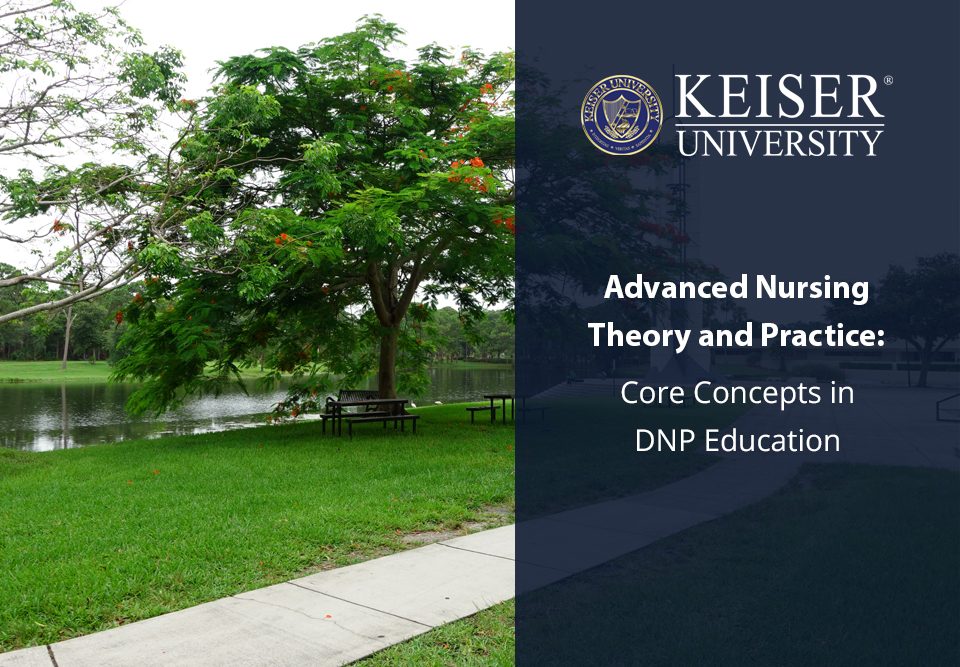Modern nursing is a research-driven field, drawing on a wealth of medical theories and studies to reveal the best practices for improving patient outcomes and quality of care. This is a critical component of advanced nursing education, in which evidence-based practice encourages nurses to carefully consider relevant research and theoretical frameworks when making decisions that influence patients — their immediate comfort along with their long-term health and well-being.
This is not an easy process to navigate, and often, nurses struggle to bridge the gap between research and practice. This is where nursing theories prove valuable. As a critical component of an advanced nursing education, theories offer a practical framework through which nurses can understand the field and the best opportunities for helping their patients. We will explore this complex interplay below, while also revealing how advanced nursing theory plays into the Doctor of Nursing Practice (DNP).
Keiser University DNP Graduate Dr. Enilaine Reyes: A Story of Growth and Achievement

What Is Nursing Theory?
Nursing theory draws on a research-backed framework to explain healthcare phenomena and to predict how various clinical situations might play out. Incorporating carefully studied concepts and principles, these theories also provide a blueprint for nurses, guiding them as they assess their patients and develop treatment plans.
As the American Nurses Association (ANA) explains, the field’s theoretical models “shape nursing research and create conceptual blueprints.” By maintaining a theoretical perspective, nurses can practice purposefully, encouraging proactive interventions and advocating on behalf of their patients.
Definition of Nursing Theory
The International Journal of Advances in Nursing Management offers a comprehensive, yet easy-to-understand definition of nursing theory. They state, “an organized and systematic articulation of a set of statements related to questions in the discipline of nursing.” The journal’s review of nursing theories adds that the assumptions that underscore nursing theory should be logical in nature but should also form the “bases for hypotheses that can be tested.”
At its most basic level, however, nursing theory involves a set of concepts that acts as a framework to guide nursing practice. The concepts incorporated in each theory reveal how nurses should care for their patients.
Historical Development of Nursing Theories
Nursing theories can be traced back to the 19th century, when the iconic Florence Nightingale transformed the field by developing the then-groundbreaking Environmental Theory. This revealed the role of numerous environmental factors (such as ventilation and cleanliness) in shaping patient outcomes and demonstrated the nurse’s ability to shape these environmental factors according to patient needs and preferences.
By the 1950s, other influential nurses were eager to follow in Nightingale’s footsteps, developing formal theories of nursing that reflected its emergence as a distinct discipline. Virginia Henderson’s Need Theory, for example, outlined the basic health needs that must be met to either facilitate patient independence or a peaceful death.
Several conceptual models entered the picture during the 1960s, including Dorothea Orem’s Self-Care Theory. This revealed how nurses could encourage patients to engage in self-care. Theories continued to grow more complex through the remainder of the 20th century, with many integrating the cultural concerns of the time. These days, the most influential theories rely on high-level research and tend to have more of a collaborative framework, revealing the need for strong teamwork and coordination of care.
Types of Nursing Theories
The ANA identifies three main types of nursing theories, categorized by their scope and specificity. These classifications determine how and when each theory can be applied. The main types of theories include:
Grand Theories
Drawing on far-reaching perspectives to address abstract concepts, grand nursing theories tend to be broad in scope but are credited with their ability to help nurses uncover a guiding philosophy to underscore their work in the healthcare field.
The ANA highlights Hildegard Peplau’s Theory of Interpersonal Relations as a solid example of a grand theory, as this delves into the broad concept of a successful nurse-patient relationship. Because the types of nurse-patient interactions explored through this theory are applicable across many environments and patient populations, it easily qualifies as grand.
Middle-Range Theories
Typically, phenomena-driven and meant to explain clinical practice trends, middle-range theories occupy the space between grand theories and practice-level theories. These theories can be verified through research, as they offer more specific frameworks than their grand theory counterparts.
Orem’s Self-Care Deficit Theory qualifies as a middle-range theory, because it emphasizes the specific processes that influence self-care (or lack thereof). This theory enables the formation of self-care hypotheses, which then support research to verify the theory.
Practice-Level Theories
Specific to the targeted practices or preferences of certain patient populations, practice-level theories are narrow in scope and must be backed by high-quality research. These theories have a clear and direct impact on nursing practice, homing in on specific and actionable concerns such as assessments or communication strategies.
Although sometimes described as a middle-range theory, Kolcaba’s Comfort Theory could potentially qualify as practice-level, since it offers direct guidance on how nurses can assess patients and enhance their comfort. The theory provides a practical framework that nurses can easily follow on the job. This theory also highlights the role of direct patient interactions, which are of critical importance in practice-level theories.
Importance of Nursing Theories in DNP Education
Nursing theories play a central role in Doctor of Nursing Practice (DNP) coursework, providing a conceptual framework on which DNP students can explore and understand the principles of nursing care. These theories also help nurses apply core principles in a variety of clinical settings and situations. By offering blueprints for research and evaluation in evidence-based practice, these theories help DNP students integrate research-backed insights.
Additionally, nursing theories may influence leadership, fostering guidance and understanding as nurse leaders strive to enact change. This is important because many students seek their DNP in hopes of ascending into leadership roles. Other considerations include:
Organization of the Healthcare Delivery System
DNP programs aim to equip nurses with a thorough understanding of healthcare delivery, offering a deep dive into the complex systems that help patients reach desired outcomes. Systems theory is particularly influential, as this reveals the interdependent nature of healthcare systems and details the many ways in which various components of those systems can interact or influence one another.
Healthcare Financing
Expanding access to care is a clear priority in modern nursing, with Leininger’s Transcultural Nursing Theory providing a framework for understanding the cultural concerns and their challenges that may limit access. DNP programs explore not only this influential theory, but also financial models that can fund programs serving broader populations.
Ethics and Professional Role Development
Offering valuable guidance as nurses navigate ethical dilemmas and strive to make principled decisions, nursing theory demonstrates how these principles shape patient care and drive various outcomes.
Nursing theories also play a vital role in facilitating continuing education, which is a priority across the field. Benner’s Novice to Expert Theory, for instance, details the stages of skill progression, revealing how nurses can expand their knowledge and hone their clinical skill set over time by committing to continuing education and professional development.
Human Differences and Social Issues
Many nursing theories address cultural concerns and the social determinants of health, allowing nurses to expand their awareness of health disparities while also encouraging them to advocate on behalf of vulnerable populations. This is another area in which Leininger’s Transcultural Nursing Theory provides valuable insight, revealing the need for cultural sensitivity. Many nurses look to this theory for guidance during assessments, taking cultural factors into account. This demonstrates top opportunities for nursing theory application, helping nurses build cultural insights into care plans.
Health Promotion and Disease Prevention
Nursing theory offers a structured approach to educating patients about health promotion and helping them understand the role they can play in improving their own health and well-being. Pender’s Health Promotion Model particularly warrants attention, as this reveals the beliefs and experiences that may determine how patients perceive and address health promotion. This can determine how committed patients are to implementing practices that improve their health and it can help nurses craft realistic interventions that take competing demands (such as busy work schedules) into account.
What Are Advanced Nursing Practices?
While nursing theories draw on peer-reviewed research to influence decision-making in the healthcare environment, nursing practices determine how clinical skills or knowledge are applied. Nursing theories can influence practices, but practices may also be shaped by personal experience, rather than relying exclusively on theoretical frameworks.
Advanced nursing practice describes a level of skill or competency above and beyond what would be expected from basic nursing care. This may involve greater autonomy and a more comprehensive scope of practice.
Definition of Advanced Nursing Practices
While the term “advanced nursing practice” is often used to reference nursing practices that call for higher levels of education or experience, this term also offers a general overview of higher-level, research-backed care that involves autonomy and a clear commitment to applying advanced nursing theory. This should not be confused with advanced practice nursing (APN), which focuses more on the roles that higher-level nurses may take on (such as advanced practice registered nurse and/or nurse practitioner).
Describing this distinction, the Journal of Nursing Scholarship explains “Advanced nursing practice is considered an extension or expansion outside the original RN scope of practice but does not address the minimum characteristics as outlined for APN.”
Integration of Nursing Theories Into Advanced Practice
The effective integration of the previously described theories can transform nursing practice, ensuring that nurses understand patients’ unique needs while allowing them to tailor interventions according to theoretical frameworks. These frameworks can also guide quality improvement initiatives and can also influence holistic care. Nursing theory application begins with fully understanding theoretical frameworks and then building them into clinical decision-making. This may involve developing care plans that reflect specific theoretical principles.
Skills and Competencies in Advanced Nursing Practices
Nurses must develop a wide range of clinical and soft skills to effectively bridge the gap between nursing theories and evidence-based practice. Critical thinking is especially important, as this allows nurses to evaluate evidence from numerous sources prior to making informed decisions. From there, problem-solving skills allow nurses to arrive at the best possible solution given the patient’s unique concerns and the applicability of various nursing research or theories.
Why Nurse Theories Are Important for DNPs
Theoretical frameworks can be useful across all corners of the nursing field, but these are especially influential for those who obtain their DNPs and go on to hold high-level clinical or leadership roles. These nurses will need to apply nursing theories to have a greater understanding of healthcare and help guide potentially difficult decisions.
Application of Theories in Clinical Practice
DNP students take a deep dive into nursing theories and research but also receive numerous opportunities to apply these theories in clinical environments. Faculty members provide valuable insight into the specifics of how key theories can be applied in various situations. Case studies and simulations can help nurses gain confidence with nursing theory application, making it easier to then apply a theoretical framework in real-world nursing situations.
Using Nursing Theories to Improve Patient Outcomes
Once DNP students are thoroughly familiar with advanced nursing theory, they should be prepared to apply theories not only to general patient care, but also in nuanced situations or settings, where a theoretical approach could have a significant impact on patient outcomes. Nurses even have the opportunity to apply theories in patient care settings, where they can see firsthand how these frameworks enhance assessments and care plans.
Role in Leadership and Advocacy
Many DNP students aspire to take on leadership roles, which allow them to guide other nurses and advocate for quality improvement on a larger scale. Many nursing theories relate specifically to leadership practices, providing a similarly impactful framework that nurse leaders can apply. These theories can help nurses adopt a transformational style of leadership, which the ANA describes as involving “awareness of the current health care system and [an] eagerness to collaborate with their team to identify flaws and transform the system for the good of patients and staff.”
Integration of Nursing Theories
While many nurses are familiar with the field’s most respected and influential theories, they may struggle to integrate these into advanced nursing practice. Many challenges stand in the way, including large caseloads and significant time constraints. If fully understood and properly integrated, these theories can still have a huge impact on patient care, influencing not only specific patient outcomes, but also helping nurses advocate for healthcare policies that have a powerful impact on patients from all walks of life.
Meeting Future Healthcare Demands
Although nursing theories may evolve over time, many theories remain as relevant today as they were when first introduced decades ago. These theories can continue to provide powerful insights into the fundamental role of the nurse within the healthcare field and the power of evidence-based practice to boost patient outcomes. While exploring the social determinants of health and by addressing ongoing disparities.
Research and Evidence-Based Practice
Offering a blueprint for study design, advanced nursing theory can influence data collection efforts, including the selection of variables. These theories can help researchers identify the factors that influence patient behaviors or outcomes. Beyond this, theories help researchers interpret theories in a broader, more holistic context that reflects the realities of the modern healthcare field.
Theories in Healthcare Policy
Many nurses look to theories to improve understanding among policymakers, who may otherwise struggle to grasp the challenges facing nurses, patients and the entire healthcare sector. Nursing theories provide a solid framework to guide nurses as they advocate for evidence-backed healthcare policies that they believe will benefit patients and the public.
Taking the Next Step: Toshia Knous’ Inspiring Journey in the Doctor of Nursing Practice Program

Elevate Your Nursing Practice With Keiser University’s DNP Program
If you are committed to improving patient care, you should understand the value of a high-level education and the need to explore advanced nursing theory and cutting-edge research. These are priorities within Keiser University’s Doctor of Nursing Practice (DNP) program, which encourages you to make a meaningful impact through advanced practice nursing and nursing leadership.
We are also pleased to offer tailored programs such as the Doctor of Nurse Anesthesia Practice, which provides powerful preparation on the path to becoming a Certified Registered Nurse Anesthetist (CRNA). Feel free to discuss your goals with one of our graduate admissions counselors.






 The instructors at Keiser University impacted my life. They believed in my ability to become a great graphic designer, regardless of how I felt about my skills. KU helped to prepare me for the real world and got me to where I am today.
The instructors at Keiser University impacted my life. They believed in my ability to become a great graphic designer, regardless of how I felt about my skills. KU helped to prepare me for the real world and got me to where I am today.
